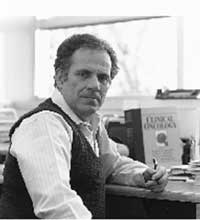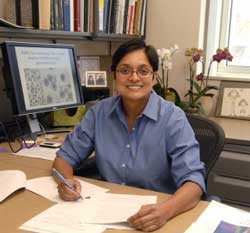Discuss this article on the forums
 ‘Names’ Step Out – A key, key need for 25 years has been to get distinguished researchers, ‘names’, interested in ME/CFS. We’ve always had good, committed researchers but rarely have we had people who could be counted as ‘opinion-makers’ or leaders.
‘Names’ Step Out – A key, key need for 25 years has been to get distinguished researchers, ‘names’, interested in ME/CFS. We’ve always had good, committed researchers but rarely have we had people who could be counted as ‘opinion-makers’ or leaders.
That is changing – quickly. The WPI’s XMRV finding has uncovered supporters – some of them in high places – whom we did not know we had. We’re seeing a cadre of respected researchers emerge, who’ve believed ME/CFS is a biologically derived disorder for years but have not until now had significant opportunities to act. Now they are raising their hands and getting into the game. They come armed with reputations, resources and clout.
Frien ds in High Places – The appearance of Dr. Ruscetti and Dr. Silverman on the WPI’s Science paper was the first big shock. Dr. Alter, a winner of the highest honor in the medical community- the Lasker Award – and Dr. Lo were next. Dr. Lo has had his eye on ME/CFS for decades and even dipped his toes into the water (having authored a paper on CFS and mycoplasma), and who immediately leapt in the fray when XMRV showed up. (He assured a PR Forum participant his work into ME/CFS would continue even if XMRV did not turn out).
ds in High Places – The appearance of Dr. Ruscetti and Dr. Silverman on the WPI’s Science paper was the first big shock. Dr. Alter, a winner of the highest honor in the medical community- the Lasker Award – and Dr. Lo were next. Dr. Lo has had his eye on ME/CFS for decades and even dipped his toes into the water (having authored a paper on CFS and mycoplasma), and who immediately leapt in the fray when XMRV showed up. (He assured a PR Forum participant his work into ME/CFS would continue even if XMRV did not turn out).
Dr. Louis Katz was next. A infectious disease and blood specialist  who’d treated CFS patients for years he was the first Blood Official to state he did not think people with ME/CFS should donate blood and then went on to lead a webinar on XMRV for the CFIDS Association.
who’d treated CFS patients for years he was the first Blood Official to state he did not think people with ME/CFS should donate blood and then went on to lead a webinar on XMRV for the CFIDS Association.
If these researchers were the cake, Dr. Ian Lipkin was the icing on it. Dr. Vernon told me he’s believed ME/CFS was caused by a pathogen since he treated people with CFS in the mid-1980’s in San Francisco. Since that time he’s become one of the ‘go-to’ researchers in the pathogen community, is heavily involved in autism research and in understanding interactions between genes and infections. He believes many chronic illnesses (including ME/CFS) may be caused by infections. Dr. Lipkin was already collaborating with Dr. Montoya on a large pathogen study in ME/CFS. Now he’s leading the big NIH effort focused entirely on the prevalence of XMRV/MLV’s in ME/CFS.
Now in the latest display of how much XMRV has changed things, the CFIDS Association has managed to snag the most highly decorated group of CFSAC nominee’s ever.
A New ‘Listening’ at the DHHS? – The DHHS has ignored most of the requests of the ME/CFS researchers and physicians on the panel – all leaders in this field – but not always leaders outside of it. One wonders, however, how much more difficult, it will be to turn down the recommendations of one of the top pathogen hunters in the world (Dr. Lipkin)? Or the highly published Chief of the Infectious Diseases Unit at a top University (Dr Mellors)? Or a key figure in the Blood Community (Dr. Dodd)? Or one of the top XMRV researchers in the world (Dr. Singh)? As the pedigree of the CFSAC committee rises the DHHS will be more and more compelled to listen to it.
Having Dr. Vernon on the committee with her stellar resume and her finger on the pulse of the research community would only further augment this groups effectiveness.
Willing To Serve – It’s intriguing that several of the nominees are currently working on unpublished pathogens/XMRV studies. While it’s not particularly onerous in terms of ‘public’ time – a couple of days a year in meetings – the CFSAC commitment is a long term one that lasts for several years. The willingness of Dr. Lipkin, Dr. Singh and Dr. Hanson to sign on could suggest they are getting some encouraging results. In any case their commitment to this field is clear.
- Roger Dodd, PhD: Dr. Dodd is a widely published and regularly cited expert on blood safety and blood transmissible agents with 40 years’ experience with the American Red Cross addressing established and emerging infectious agents. He is a past officer of the American Association of Blood Banks (AABB) and International Society of Blood Transfusion and was appointed to a World Health Organization Expert Advisory Committee on Blood Transfusion. He currently serves as a member of the DHHS Blood XMRV Scientific Research Working Group and the AABB’s Interorganizational XMRV Task Force, bringing him into close contact with scientific and communication issues posed by the studies under way to determine the role of murine leukemia viruses in CFS.
- Maureen Hanson, PhD: Dr. Hanson is a molecular biologist whose research at Cornell University has focused on gene regulation in mitochrondria and chloroplasts. Grants supporting her labs enable the use of state-of-the-art techniques, including PCR, RT-PCR, qRT-PCR, immunoblots, enzyme activity measurement, cloning, protein expression and analysis and high-throughput DNA and cDNA sequencing. From this basis, she has spent the past five years preparing to initiate a CFS research program and has attended several CFS conferences and workshops. Earlier this year she was awarded an R-21 grant from NIH to study the role of gammaretroviruses in CFS. She is working with expert clinician Dr. David S. Bell and has already presented data from a pilot study of CFS patients at the First International XMRV Workshop.
 Ian Lipkin, PhD: The Center for Infection and Immunity at Columbia University is dedicated to global research and training programs focused on pathogen surveillance and discovery, and to understanding how gene-environment-timing interactions contribute to health and disease and, as its director, Dr. Lipkin has established himself as a world-recognized authority on these topics. He has been involved in CFS research in the past, when a link to borna disease virus was suspected in the mid-1990s. Over the years he has maintained an interest in “microbial prospecting” in chronic diseases in which individuals might “respond differently to infectious agents based on genetic and epigenetic factors, nutritional status, age, exposure history and simultaneous infectious with other microbes.” (Lipkin, 2010)
Ian Lipkin, PhD: The Center for Infection and Immunity at Columbia University is dedicated to global research and training programs focused on pathogen surveillance and discovery, and to understanding how gene-environment-timing interactions contribute to health and disease and, as its director, Dr. Lipkin has established himself as a world-recognized authority on these topics. He has been involved in CFS research in the past, when a link to borna disease virus was suspected in the mid-1990s. Over the years he has maintained an interest in “microbial prospecting” in chronic diseases in which individuals might “respond differently to infectious agents based on genetic and epigenetic factors, nutritional status, age, exposure history and simultaneous infectious with other microbes.” (Lipkin, 2010)- John Mellors, MD: As chief of the infectious diseases division at University of Pittsburgh, Dr. Mellors directs the primary care and clinical research activities in HIV/AIDS at UPMC Health System, providing care to over 1000 HIV-infected individuals. He has extensive experience with clinical trials of antiretrovirals, including protease inhibitors, triple drug combinations, and combination protease inhibitors. Dr. Mellors’ research as an investigator on the Multicenter AIDS Cohort Study has provided insight into the relationship between viral load and disease outcome. His laboratory has focused on the problem of HIV resistance to antiretroviral drugs. His work in this area has helped define the genetic and biochemical basis for HIV resistance. His laboratory developed recombinant retroviral systems to detect drug resistant HIV.
- Charles McBrayer Sasser, JD: Mr. Sasser has represented individuals with CFS in disability and employment cases for more than 20 years. He is a past president of the National Organization of Social Security Claimants’ Representatives and a former member of the Board of Directors of the CFIDS Association of America. He is extremely knowledgeable about the processes by which disability benefits are evaluated by private insurers and the Social Security Administration and the types of medical evidence that can be helpful to establish disability in these cases.
 Ila Singh, MD, PhD: Dr. Singh leads several important research investigations into XMRV in prostate cancer and CFS at the University of Utah and ARUP Laboratories. Working with expert CFS clinician Dr. Lucinda Bateman (a former member of the CFS Advisory Committee), she is testing samples obtained from 105 well-characterized CFS patients and 200 regional matched healthy controls. This study will provide important data about the prevalence of XMRV and other murine leukemia viruses in CFS. Dr. Singh has also conducted experiments testing various agents against these viruses in vitro. She is knowledgeable about the challenges of properly characterizing CFS and detecting emerging pathogens in human disease.
Ila Singh, MD, PhD: Dr. Singh leads several important research investigations into XMRV in prostate cancer and CFS at the University of Utah and ARUP Laboratories. Working with expert CFS clinician Dr. Lucinda Bateman (a former member of the CFS Advisory Committee), she is testing samples obtained from 105 well-characterized CFS patients and 200 regional matched healthy controls. This study will provide important data about the prevalence of XMRV and other murine leukemia viruses in CFS. Dr. Singh has also conducted experiments testing various agents against these viruses in vitro. She is knowledgeable about the challenges of properly characterizing CFS and detecting emerging pathogens in human disease. Suzanne Vernon, PhD: For 13 years Dr. Vernon has dedicated her training and talents to applying systems biology based models to the study of CFS, building productive networks of scientists and translating information gained from research to the patient community and other stakeholder groups. She has communicated effectively with funding agencies, the media and policymakers about the challenges and needs of scientists working on CFS and has built a reputation for rigor and credibility. She is the scientific director of the CFIDS Association of America and serves as a member of the Board of Directors of the International Association for CFS/ME. She is also a member of the DHHS Blood XMRV Scientific Research Working Group.
Suzanne Vernon, PhD: For 13 years Dr. Vernon has dedicated her training and talents to applying systems biology based models to the study of CFS, building productive networks of scientists and translating information gained from research to the patient community and other stakeholder groups. She has communicated effectively with funding agencies, the media and policymakers about the challenges and needs of scientists working on CFS and has built a reputation for rigor and credibility. She is the scientific director of the CFIDS Association of America and serves as a member of the Board of Directors of the International Association for CFS/ME. She is also a member of the DHHS Blood XMRV Scientific Research Working Group.
The research field is a broad one with many conflicting points of view. Most are holding judgment on ME/CFS and much more study is, of course, needed to for an biological emphasis on ME/CFS to achieve its just due but this latest group indicates more and more powerful and influential individuals are intrigued (Dr. Ruscetti would probably say ‘fascinated’) by ME/CFS – a very good sign indeed.

 Ian Lipkin, PhD: The Center for Infection and Immunity at Columbia University is dedicated to global research and training programs focused on pathogen surveillance and discovery, and to understanding how gene-environment-timing interactions contribute to health and disease and, as its director, Dr. Lipkin has established himself as a world-recognized authority on these topics. He has been involved in CFS research in the past, when a link to borna disease virus was suspected in the mid-1990s. Over the years he has maintained an interest in “microbial prospecting” in chronic diseases in which individuals might “respond differently to infectious agents based on genetic and epigenetic factors, nutritional status, age, exposure history and simultaneous infectious with other microbes.” (Lipkin, 2010)
Ian Lipkin, PhD: The Center for Infection and Immunity at Columbia University is dedicated to global research and training programs focused on pathogen surveillance and discovery, and to understanding how gene-environment-timing interactions contribute to health and disease and, as its director, Dr. Lipkin has established himself as a world-recognized authority on these topics. He has been involved in CFS research in the past, when a link to borna disease virus was suspected in the mid-1990s. Over the years he has maintained an interest in “microbial prospecting” in chronic diseases in which individuals might “respond differently to infectious agents based on genetic and epigenetic factors, nutritional status, age, exposure history and simultaneous infectious with other microbes.” (Lipkin, 2010) Ila Singh, MD, PhD: Dr. Singh leads several important research investigations into XMRV in prostate cancer and CFS at the University of Utah and ARUP Laboratories. Working with expert CFS clinician Dr. Lucinda Bateman (a former member of the CFS Advisory Committee), she is testing samples obtained from 105 well-characterized CFS patients and 200 regional matched healthy controls. This study will provide important data about the prevalence of XMRV and other murine leukemia viruses in CFS. Dr. Singh has also conducted experiments testing various agents against these viruses in vitro. She is knowledgeable about the challenges of properly characterizing CFS and detecting emerging pathogens in human disease.
Ila Singh, MD, PhD: Dr. Singh leads several important research investigations into XMRV in prostate cancer and CFS at the University of Utah and ARUP Laboratories. Working with expert CFS clinician Dr. Lucinda Bateman (a former member of the CFS Advisory Committee), she is testing samples obtained from 105 well-characterized CFS patients and 200 regional matched healthy controls. This study will provide important data about the prevalence of XMRV and other murine leukemia viruses in CFS. Dr. Singh has also conducted experiments testing various agents against these viruses in vitro. She is knowledgeable about the challenges of properly characterizing CFS and detecting emerging pathogens in human disease. Suzanne Vernon, PhD: For 13 years Dr. Vernon has dedicated her training and talents to applying systems biology based models to the study of CFS, building productive networks of scientists and translating information gained from research to the patient community and other stakeholder groups. She has communicated effectively with funding agencies, the media and policymakers about the challenges and needs of scientists working on CFS and has built a reputation for rigor and credibility. She is the scientific director of the CFIDS Association of America and serves as a member of the Board of Directors of the International Association for CFS/ME. She is also a member of the DHHS Blood XMRV Scientific Research Working Group.
Suzanne Vernon, PhD: For 13 years Dr. Vernon has dedicated her training and talents to applying systems biology based models to the study of CFS, building productive networks of scientists and translating information gained from research to the patient community and other stakeholder groups. She has communicated effectively with funding agencies, the media and policymakers about the challenges and needs of scientists working on CFS and has built a reputation for rigor and credibility. She is the scientific director of the CFIDS Association of America and serves as a member of the Board of Directors of the International Association for CFS/ME. She is also a member of the DHHS Blood XMRV Scientific Research Working Group.